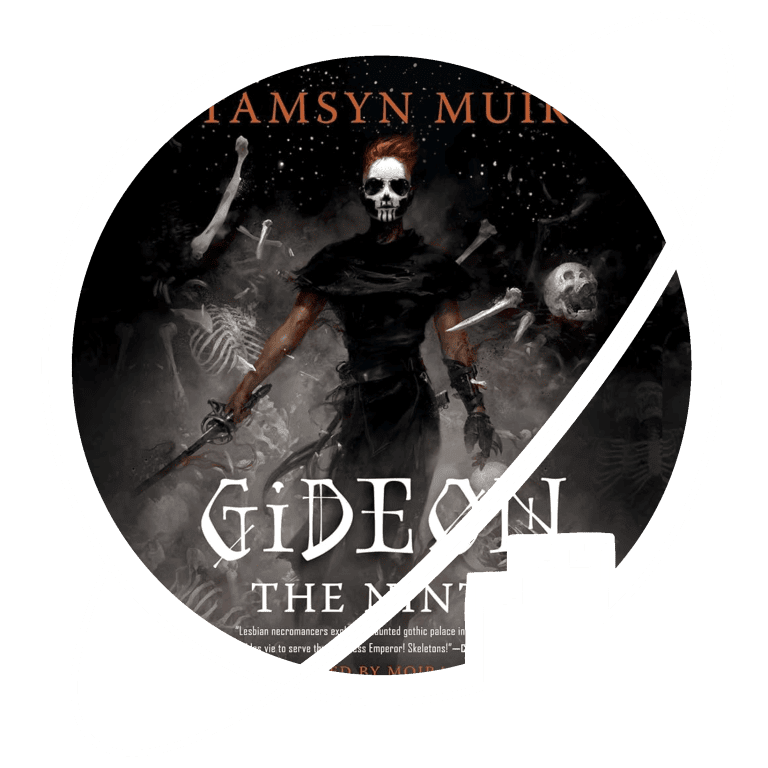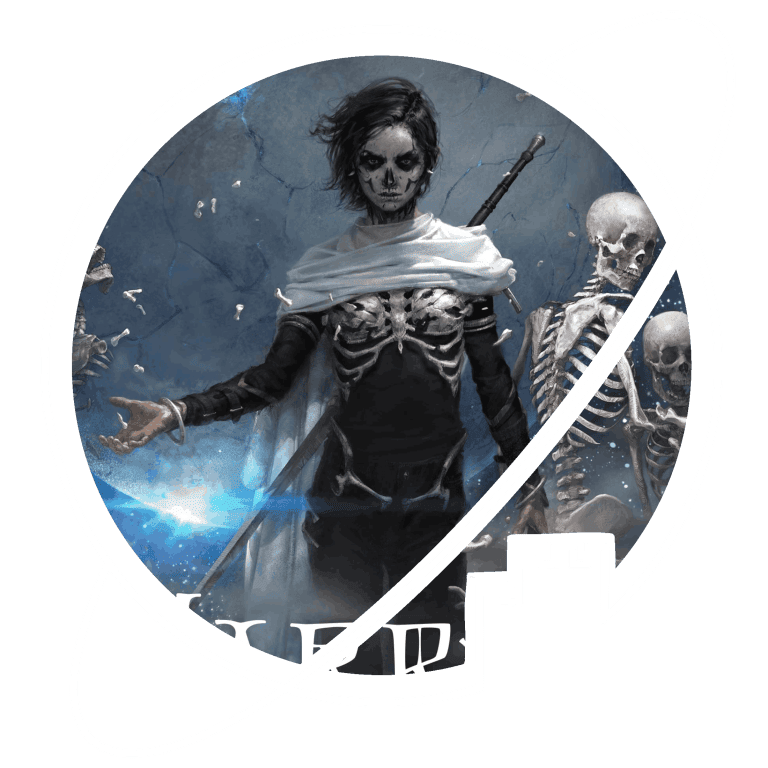- Novel written by Tamsyn Muir
- Published September 10th, 2019
- Part one of the Locked Tomb series


I’ve seen Gideon the Ninth around for a long time, and I was never hugely interested in reading it. I’ll be honest: I don’t care for the skull face paint, so I was never really drawn to the cover. I did know that other people were loving it, though. Recently I decided to go back to listening to audiobooks, and Gideon the Ninth was the first book I ended up listening to.
I have to preface this review by saying that I kind of struggle with audiobooks sometimes. I’m really bad at listening! If I were to rewind every time I noticed my attention drifting elsewhere, I’d have to rewind pretty much a whole book. I don’t think Gideon the Ninth was the right book to listen to for me, to be quite honest. A LOT happens, and there is a huge cast of characters. It even starts with a Dramatis Personae, which had me slightly worried. I think if I’d read the physical book it may have been easier for me to keep up with who’s whom. Overall I don’t think I missed out on a lot, but the characters did all blend into one a little bit (with some exceptions). If you don’t struggle with paying attention, I would really recommend the audiobook, because Moira Quirk does a phenomenal job of narrating this story.
Gideon the Ninth is one of those books that are very hard to categorise. It’s kind of fantasy, kind of sci-fi, kind of horror? At the same time, it’s really none of those genres. It’s always refreshing to find a book like this. It also means that it can be slightly harder to understand the characters and their motives. The book starts with Gideon wanting to escape the Ninth House, but while it is clear what she’s trying to escape from, it wasn’t at all clear to me where she wanted to escape to. Even at the end of the book, you don’t have much of a sense of what the universe of Gideon the Ninth is like. The novel doesn’t really evoke anything familiar, which means it has to work a little harder on the characters to keep the reader engaged.
The main characters are where Gideon the Ninth really shines. Gideon is a phenomenal main character, and her relationship with Harrowhark Nonagesimus is really fun to read. I also really enjoyed the character of Dulcinea Septimus.
The style of writing felt very young adult, but not in a bad way (because yes, I’m sorry, there IS a bad way). It is quite unusual in that the writing does not feel fitting to the setting of the story. However, it’s done in such an intentional way that it becomes a charming feature rather than a distracting one.
Overall I wish I would have read the physical book instead of listening to the audiobook. While the audiobook was great, I think I would have retained more if my mind hadn’t been able to wander so often. I may well be reading the sequel sometime soon!

Listened to the audiobook with Moira Quirk. No trouble with the narrator, but I have to agree with Lotte that a book that throws a dramatis personae your way, introduces a cast of characters with similar sounding silly names, then tosses them and re-introduces a completely different and even larger cast of characters with (somewhat) similar sounding silly names is perhaps best read rather than listened to. I’m generally an attentive listener, but it took me a few hours until I finally looked up fan drawings of the characters so I could start telling them apart. I didn’t feel like I missed much, though, which may or may not say a lot about this book and/or about me.
Gideon the Ninth is one of the weirder books I’ve read recently. I mean, whoever came up with a Halloween-decorations-spooky-science-fantasy-horror young adult novel about lesbian necromancers and also fencing? I certainly wouldn’t have. And to be honest, that’s maybe one of the reasons Gideon the Ninth didn’t click for me.
Tamsyn Muir deserves all kinds of credit for bringing together these tropes and creating perhaps one of the most unexpected novels put to paper over the last years. In a sense, it is what the speculative genre is all about: coming up with new ideas and combinations that trigger the imagination.
This time, though, the result sort of fell flat for me. Muir makes a very deliberate choice to have her teenagers in this science fantasy horror universe sound like, and act like, modern day teenagers. Which, let’s be real, is kind of cringe. Intentional cringe, but still cringe. This combines with the edgy Halloween-horror vibe and Warhammer-level over the top silly names (”Harrowhark Nonagesimus” “Coronabeth Tridentarius” “Priamhark Noniusvianus” – I did not just come up with those) for a level of cringe that was, frankly, a little much to stomach.
Now, I realise that edgy teenage cringe is probably a more interesting/original take on this kind of story than Grimdark Pessimism and Deep Suffering ™ would have been. Unfortunately, I seem to sometimes like Grimdark Pessimism and Deep Suffering ™ and edgy teenage cringe, well, not so much.
So, what we are left with is a story that is amazingly original and creative, but makes all the wrong choices for me to like it. Clearly the potential was there. Unfortunately, rather than focusing on word building, or an interesting hard-magic-necromancy-system, or complex politics between the houses, or even, really, a strong mystery plot, Muir goes for teenage rivalry and anxiety and hormones. The wider universe never really comes into focus, the nine houses are nominally different but I didn’t feel any depth to those differences, the plot is perfectly functional but not really set up for the reader to actually guess ahead of the characters so you’re really just along for the ride. In conclusion: not a bad book at all, but I am very much not the target audience.
One point I do need to go into though. The fencing. Our protagonist Gideon is a fencer! In fact, she does (two-handed) longsword (just like me!) and is then forced to switch over to (single handed) rapier. You can tell that Muir must have had some level of input from an actual HEMA (Historical European Martial Arts)-practitioner, because she gets too much right for it to be a mere coincidence. Fights are quick and decisive, weapons are used like they’re supposed to be used. Some of the best dueling scenes I’ve read in a long while! I’m honestly pretty impressed.
But I have a feeling she doesn’t actually fence herself. She describes Gideon’s trouble switching from longsword to rapier. Of course I’m not Gideon, but I’m a longsword fencer occasionally dabbling in rapier, and I can tell you that my main struggle is that you’re constantly trying to use a rapier as a cutting sword when it really isn’t well suited for that – besides that, principles from the bind aren’t all that different between rapier and longsword. Unlike Gideon, I was using my second hand just fine (but then, I also did some saber and messer, and we train wrestling with the sword on a semi-regular basis so I am not afraid of taking a hand off my grip every now and then). Still, the fact that I’m even able to have this kinds of a discussion is a win in my book!
Tagged:
- Action, Adventure, Atmospheric, Award winning, Bonding, Book, Character-Driven, Dystopian, Fantasy, Female Author, Horror, Humor, LGBTQ+, Locus Award, Low Fantasy, Mysterious Parentage, Mystery, Occult, Original Setting, Quest, Science Fantasy, Science Fiction, Series, Teenagers, Violence & Gore, Young Adult








